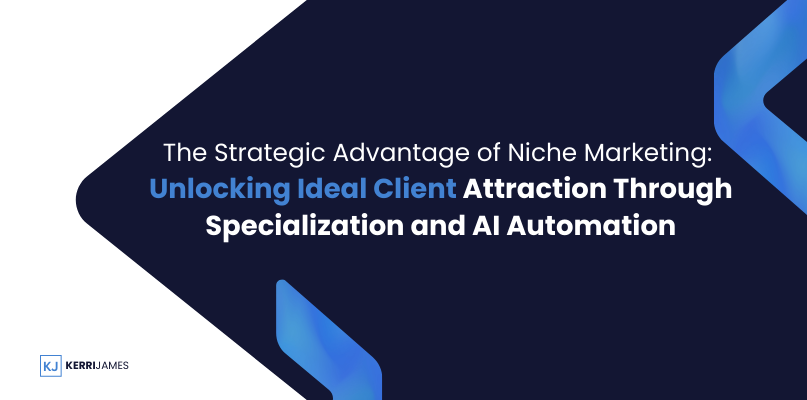In an increasingly competitive legal landscape, being a generalist law firm no longer guarantees success. To truly stand out and build long-term relationships with clients, law firms need to specialize and narrow their focus. Specialization through niche marketing allows firms to differentiate themselves, enhance their credibility, and attract a more targeted audience. This isn’t merely a matter of branding—it’s a strategic business decision that can dramatically improve client acquisition, retention, and overall business growth.
The importance of niche marketing cannot be overstated. By focusing on a specific area of law, law firms position themselves as experts in that niche, making it easier to market their services to the right audience. Clients are more likely to trust firms that demonstrate a deep understanding of their specific legal needs, leading to stronger relationships and more profitable engagements.
But niche marketing isn’t just about choosing an area of specialization and hoping for the best. It’s about effectively communicating that expertise to the right audience. This is where artificial intelligence (AI) comes into play. AI is revolutionizing the way businesses, including law firms, approach marketing. By leveraging AI tools, law firms can automate niche marketing efforts, gather data-driven insights, and optimize every aspect of their outreach strategy.
This blog will explore why niche marketing is crucial for law firms, how AI can enhance and automate this process, and provide practical strategies for law firms to use specialization to drive client acquisition and business growth.
Why Specialization Works: The Power of Niche Marketing
The legal profession is vast, covering everything from criminal defense to real estate transactions. For decades, many law firms have cast a wide net, offering general services to appeal to the broadest possible audience. But the market is shifting. Clients no longer want jack-of-all-trades firms; they want experts who can solve their specific problems.
Niche marketing, which involves narrowing your practice area to a specific segment or legal specialty, allows law firms to carve out a distinct identity. By honing in on a particular legal focus, a firm becomes more attractive to clients who are actively seeking specialized services. Niche marketing offers numerous benefits, including:
1. Establishing Authority and Expertise
When your law firm specializes in a particular legal niche, you can build an unmatched level of expertise. Whether your firm focuses on healthcare compliance, intellectual property for tech startups, or estate planning for high-net-worth individuals, narrowing your focus enables you to delve deeply into the issues that matter most in that area. This level of expertise creates authority, which builds trust with prospective clients.
Clients facing complex legal challenges want to work with attorneys who truly understand their specific problems. They are more likely to hire a law firm that has a strong track record of success in handling cases similar to their own. For example, a boutique law firm specializing in intellectual property law for the biotech industry will naturally attract clients in that field who need legal protection for their innovations. These clients will feel more comfortable entrusting their cases to experts who understand the nuances of biotech IP rather than a generalist firm.
Moreover, specialized firms tend to attract better referrals. Industry professionals and other law firms are more likely to refer clients to a niche expert, knowing that their referral will receive focused, high-quality attention.
2. Higher-Quality Client Leads and Stronger Relationships
Niche marketing leads to stronger, more aligned client relationships. By focusing on a specialized area, you ensure that the clients who approach you already have a vested interest in your expertise. This alignment allows for more in-depth discussions during consultations, as clients understand that your firm is well-equipped to handle their needs.
For example, a law firm specializing in environmental law will attract companies facing regulatory compliance issues, advocacy groups fighting for environmental justice, or industries like energy and manufacturing, which are subject to stringent environmental regulations. These clients are more likely to engage with a firm that speaks their language and understands the intricacies of the law as it pertains to their specific circumstances.
Furthermore, specializing in a niche enables law firms to deliver tailored solutions. This is particularly valuable in legal niches that require a nuanced approach, such as tax law, immigration law, or corporate governance. When clients feel that their unique needs are understood, they are more likely to maintain long-term relationships, which can lead to higher client retention and ongoing legal work.
3. Enhanced Marketing ROI
Targeting a specific legal niche enables law firms to allocate marketing resources more effectively. Instead of spreading marketing efforts across various practice areas, niche firms can focus on a single segment, optimizing their campaigns to resonate with the needs and pain points of their ideal clients.
For example, a law firm that specializes in employment law for small businesses can create highly targeted marketing campaigns that address the legal challenges small business owners face, such as wrongful termination claims or compliance with labor regulations. The firm’s messaging can be refined to address the concerns of this specific audience, which increases the likelihood of attracting and converting leads.
Additionally, niche marketing often leads to lower customer acquisition costs (CAC). When law firms speak directly to the needs of a focused audience, their marketing efforts are more likely to resonate, reducing the amount of time and money spent trying to appeal to a broad, generalized audience.
4. Strengthening Competitive Positioning
In today’s saturated legal market, it’s harder than ever for law firms to stand out. Offering broad legal services may cast a wide net, but it also means your firm will be competing with countless others offering the same services. Specialization allows your firm to dominate a specific area of the market, giving you a distinct competitive edge.
When your firm becomes known as the go-to legal expert in a particular niche, you no longer have to compete on price or general reputation. Instead, clients seek you out specifically for your expertise. This positions your firm as a thought leader in the industry, helping to solidify your brand and attract higher-value clients who are willing to pay a premium for specialized services.
The Challenges of Niche Marketing: Why Firms Hesitate to Specialize
Despite the benefits of niche marketing, some law firms remain hesitant to specialize. There are valid concerns about limiting your target audience, particularly for smaller firms that may fear missing out on broader opportunities. While focusing on a niche may appear to shrink your market, the reality is that it allows you to command higher fees, work with more qualified clients, and build a stronger reputation.
However, the biggest challenge of niche marketing is the need to build authority within the chosen niche. To succeed, law firms must invest time and resources in creating educational content, engaging with prospective clients, and staying on top of legal developments in their field. Additionally, some firms may face internal resistance to narrowing their focus, particularly if they have historically operated as generalists.
This is where AI tools can dramatically change the game. By automating many of the time-consuming tasks associated with niche marketing, AI helps law firms streamline their efforts while improving the precision and impact of their campaigns.
How AI Enhances Niche Marketing for Law Firms
Artificial intelligence has transformed the way businesses operate, and law firms are no exception. AI tools can help firms enhance every aspect of their niche marketing strategies, from content creation and lead generation to data analysis and client outreach. With AI, law firms can automate many of the repetitive, manual tasks that often take up valuable time and resources, allowing them to focus on high-value work.
Here’s how AI can enhance and automate niche marketing for law firms:
1. Client Data Analysis and Segmentation
One of the most powerful capabilities of AI is its ability to analyze large datasets quickly and efficiently. Law firms can use AI-powered tools to analyze client data, identify patterns, and uncover insights about their most profitable clients. This allows firms to segment their client base and focus on the areas where they are most successful.
For instance, an immigration law firm might discover that its most profitable clients are high-net-worth individuals seeking investment-based visas. With this information, the firm can tailor its marketing efforts to target this specific audience, creating content and campaigns that speak directly to their needs and challenges.
AI tools can also help firms identify under-served segments within their niche. For example, an estate planning firm might find that there is a growing demand for specialized services among families with complex trust arrangements. By using AI to identify this trend, the firm can adjust its marketing strategy to target these clients, offering tailored solutions that set it apart from competitors.
2. Automated Content Creation and Personalization
Content marketing is a crucial component of niche marketing, but it can be time-consuming to create high-quality, relevant content on a regular basis. AI-powered content generation tools can help law firms automate this process, generating blog posts, articles, case studies, and social media updates that speak directly to the firm’s target audience.
For example, a family law firm could use AI tools to generate blog content about child custody laws, divorce mediation, or prenuptial agreements. These AI-driven content platforms can analyze the firm’s target audience and create content that resonates with their needs, ensuring that the firm remains visible and relevant in search engine rankings.
In addition to generating content, AI tools can help law firms personalize their messaging. By analyzing client behavior and engagement, AI can tailor email campaigns, website content, and even social media posts to match the preferences and needs of individual clients. For example, if a client visits the firm’s website to read about estate planning for high-net-worth individuals, the AI system can send them personalized content and follow-up messages that address their specific concerns.
3. Search Engine Optimization (SEO) and Online Visibility
AI tools can also play a significant role in optimizing a law firm’s online visibility through SEO. AI-powered SEO tools can analyze search trends, competitor strategies, and user behavior to help firms identify the most relevant keywords and topics for their niche. These insights allow firms to create content that ranks higher in search engine results, increasing the likelihood that potential clients will find the firm when searching for legal services in their area of specialization.
For example, a law firm specializing in personal injury law might use AI to discover that searches for “traumatic brain injury claims” are increasing in their area. The firm can then create targeted content around this topic, ensuring that they rank highly for these keywords and attract clients searching for legal assistance with traumatic brain injury cases.
4. Automated Client Communication and Engagement
AI-powered chatbots and automated email systems can significantly enhance client communication and engagement. Chatbots can handle basic client inquiries, answer frequently asked questions, and collect preliminary information from potential clients, all while operating 24/7. This ensures that no lead goes unaddressed, even outside of regular business hours.
For example, a chatbot on a real estate law firm’s website could help potential clients by answering questions about property transactions, zoning regulations, or lease agreements. The chatbot can also schedule consultations, collect contact information, and follow up with leads, freeing up the firm’s staff to focus on higher-level tasks.
AI can also be used to automate follow-up communication with potential clients. By analyzing client behavior, such as which pages they visit on the firm’s website or which emails they open, AI-powered email platforms can send personalized follow-up messages that address the client’s specific interests. For instance, if a client expresses interest in business formation services, the AI system can automatically send them additional information about LLC formation, corporate governance, or tax planning.
5. Predictive Analytics and Lead Scoring
Predictive analytics is one of the most powerful applications of AI in niche marketing. By analyzing past client data and engagement patterns, AI tools can predict which types of leads are most likely to convert into paying clients. This allows law firms to prioritize their marketing efforts on high-value leads, reducing wasted resources and improving client acquisition rates.
For example, a firm specializing in intellectual property law might use predictive analytics to identify which startup founders are most likely to need patent filing services based on their industry and past engagement with the firm’s content. The AI system can score these leads based on their likelihood to convert, allowing the firm to focus its marketing efforts on the most promising opportunities.
6. Streamlining Client Intake and Lead Qualification
AI tools can also streamline the client intake process, making it easier for law firms to qualify leads and determine whether they align with the firm’s niche. AI-powered intake forms can ask prospective clients specific questions about their legal needs, helping to filter out leads that may not be a good fit.
For example, a law firm specializing in elder law might use AI-powered intake forms to ask questions about the client’s estate planning needs, healthcare directives, or guardianship concerns. Based on the client’s responses, the AI system can categorize leads and prioritize those that are most relevant to the firm’s expertise.
This automation ensures that law firms spend less time sifting through unqualified leads and more time focusing on high-value clients who are likely to need specialized legal services.
Crafting an Effective AI-Powered Niche Marketing Strategy
To fully leverage the benefits of AI in niche marketing, law firms need to develop a strategic approach. Here are the steps to crafting an effective AI-powered niche marketing strategy:
1. Identify and Define Your Niche
The first step in any niche marketing strategy is to clearly define your area of specialization. This could be based on practice area (e.g., family law, tax law, or immigration law), industry (e.g., healthcare, real estate, or technology), or client type (e.g., individuals, small businesses, or large corporations).
Once your niche is defined, you can use AI tools to analyze client data, identify patterns, and uncover opportunities within that niche.
2. Use AI for Market Research and Client Insights
AI-powered tools can help law firms conduct market research and uncover insights about their target audience. By analyzing search trends, industry developments, and client behavior, AI can reveal new opportunities within your niche and help your firm stay ahead of competitors.
For example, an employment law firm might use AI to identify a growing demand for legal services related to remote work agreements and compliance with telecommuting regulations. Armed with this insight, the firm can adjust its marketing strategy to target businesses in need of remote work compliance services.
3. Leverage AI for Content Creation and Personalization
Once your niche is defined and your target audience is understood, use AI tools to create personalized content that speaks directly to their needs. AI-driven content platforms can generate blog posts, articles, social media updates, and email campaigns that align with your firm’s niche and resonate with your audience.
Additionally, AI can help law firms personalize their communication, ensuring that every client interaction feels relevant and tailored to their specific legal concerns.
4. Automate Client Outreach and Follow-Up
AI-powered CRM systems, chatbots, and email marketing platforms can help law firms automate client communication, ensuring that no lead is left unattended. These tools can send personalized emails, schedule consultations, and follow up with potential clients based on their engagement with the firm’s content.
By automating these processes, law firms can maintain high levels of client engagement without overburdening their staff.
5. Use Predictive Analytics to Optimize Lead Generation
AI-powered predictive analytics tools can help law firms identify the types of clients that are most likely to convert into paying clients. By analyzing past client behavior and engagement data, AI can predict which leads are most promising, allowing firms to focus their marketing efforts on high-value opportunities.
Predictive analytics can also help firms forecast future demand in their niche, enabling them to adjust their marketing strategies to capitalize on emerging trends.
Final Words: Unlocking the Full Potential of Niche Marketing with AI
Niche marketing offers law firms an unparalleled opportunity to differentiate themselves in a crowded legal market, attract ideal clients, and build long-term relationships. Specialization allows firms to position themselves as experts in their chosen area of law, delivering tailored solutions that resonate with their target audience.
By incorporating AI into their niche marketing strategies, law firms can further optimize their efforts, automating time-consuming tasks, gaining deeper insights into client behavior, and improving lead generation and conversion rates. AI-driven tools not only help law firms streamline their marketing efforts but also enable them to personalize client communication and stay ahead of industry trends.
As the legal industry continues to evolve, those who embrace AI to enhance their niche marketing strategies will be better positioned to grow, scale, and succeed in an increasingly competitive environment.










